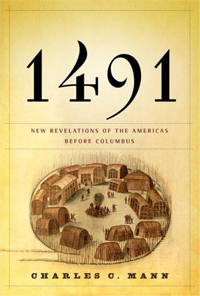1491: New Revelations of the Americas Before Columbus
 |
|
| Author | Charles C. Mann |
|---|---|
| Genre | non-fiction |
| Publisher | Knopf |
|
Publication date
|
2005 |
| Pages | xii, 465 p. : ill., maps (1st edn.) |
| ISBN | |
| OCLC | 56632601 |
| 970.01/1 22 | |
| LC Class | E61 .M266 2005 |
| Followed by | 1493: Uncovering the New World Columbus Created |
1491: New Revelations of the Americas Before Columbus is a 2005 non-fiction book by American author and science writer Charles C. Mann about the pre-Columbian Americas. It was the 2006 winner of the National Academies Communication Award for best creative work that helps the public understanding of topics in science, engineering or medicine.
The book presents recent research findings in different fields that suggest human populations in the Western Hemisphere—that is, the indigenous peoples of the Americas—were more numerous, had arrived earlier, were more sophisticated culturally, and controlled and shaped the natural landscape to a greater extent than scholars had previously thought.
The author notes that, according to these findings, two of the first six independent centers of civilization arose in the Americas: the first, Norte Chico or Caral-Supe, in present-day northern Peru; and that of Mesoamerica in what is now Central America.
Mann develops his arguments from a variety of recent re-assessments of longstanding views about the pre-Columbian world, based on new findings in demography, climatology, epidemiology, economics, botany, genetics, image analysis, palynology, molecular biology, biochemistry, and soil science. Although there is no consensus, and Mann acknowledges controversies, he asserts that the general trend among scientists currently is to acknowledge:
These three main foci (origins/population, culture, and environment) form the basis for three parts of the book.
...
Wikipedia
